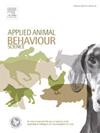Effects of heat stress on feeding and drinking behavior of confined Texel sheep in a tropical environment
IF 2
2区 农林科学
Q1 AGRICULTURE, DAIRY & ANIMAL SCIENCE
引用次数: 0
Abstract
This study aimed to evaluate the effects of heat stress on feeding and drinking behavior patterns of confined Texel sheep under tropical environmental conditions. Forty Texel ewes were monitored for 72 days in an experimental facility equipped with automated systems for individual feed and water intake recording. Meteorological variables such as air temperature, relative humidity, and temperature-humidity index (THI) were recorded daily. Behavioral parameters assessed included number and duration of visits to feeders and waterers, as well as effective intake. Principal component analysis (PCA) was used to explore patterns and discriminate behavior across THI categories. Results indicated that higher THI values, especially in the afternoon, significantly influenced water and feed intake patterns. Animals exposed to more stressful conditions showed increased water intake, more frequent visits to waterers, and shorter feeding events. These behavioral adaptations are consistent with thermoregulatory strategies aimed at reducing internal heat load and maintaining homeostasis. Despite the challenging conditions, no metabolic disorders or critical heat stress indicators were observed, likely due to environmental management that provided shade and protection from direct sunlight. Multivariate analyses effectively discriminated between thermal environments based on behavioral parameters, confirming that heat stress alters feeding and drinking behavior in confined sheep. These findings highlight the importance of monitoring animal behavior as an indicator of thermal comfort and underscore the need for adaptive management strategies in confinement systems to ensure animal welfare and maintain productivity in tropical regions.
热带环境下热应激对禁闭特塞尔羊摄食行为的影响
本研究旨在评价热带环境条件下热应激对禁闭特塞尔羊摄食行为模式的影响。对40只特塞尔母羊进行了72天的监测,实验设施配备了自动记录个体采食量和饮水量的系统。每天记录气温、相对湿度、温湿度指数(THI)等气象变量。评估的行为参数包括访问喂食器和饮水器的次数和持续时间,以及有效摄入量。主成分分析(PCA)用于探索模式和区分THI类别的行为。结果表明,较高的THI值,特别是在下午,对取水和采食模式有显著影响。暴露在更大压力条件下的动物表现出更多的饮水量,更频繁地去饮水,更短的进食时间。这些行为适应与旨在减少内部热负荷和维持体内平衡的体温调节策略一致。尽管条件艰难,但没有观察到代谢紊乱或关键的热应激指标,这可能是由于环境管理提供了遮阳和保护,免受阳光直射。多变量分析有效地区分了基于行为参数的热环境,证实热应激改变了圈养羊的摄食和饮水行为。这些发现强调了监测动物行为作为热舒适指标的重要性,并强调了在禁闭系统中采取适应性管理策略以确保动物福利和保持热带地区生产力的必要性。
本文章由计算机程序翻译,如有差异,请以英文原文为准。
求助全文
约1分钟内获得全文
求助全文
来源期刊

Applied Animal Behaviour Science
农林科学-行为科学
CiteScore
4.40
自引率
21.70%
发文量
191
审稿时长
18.1 weeks
期刊介绍:
This journal publishes relevant information on the behaviour of domesticated and utilized animals.
Topics covered include:
-Behaviour of farm, zoo and laboratory animals in relation to animal management and welfare
-Behaviour of companion animals in relation to behavioural problems, for example, in relation to the training of dogs for different purposes, in relation to behavioural problems
-Studies of the behaviour of wild animals when these studies are relevant from an applied perspective, for example in relation to wildlife management, pest management or nature conservation
-Methodological studies within relevant fields
The principal subjects are farm, companion and laboratory animals, including, of course, poultry. The journal also deals with the following animal subjects:
-Those involved in any farming system, e.g. deer, rabbits and fur-bearing animals
-Those in ANY form of confinement, e.g. zoos, safari parks and other forms of display
-Feral animals, and any animal species which impinge on farming operations, e.g. as causes of loss or damage
-Species used for hunting, recreation etc. may also be considered as acceptable subjects in some instances
-Laboratory animals, if the material relates to their behavioural requirements
 求助内容:
求助内容: 应助结果提醒方式:
应助结果提醒方式:


